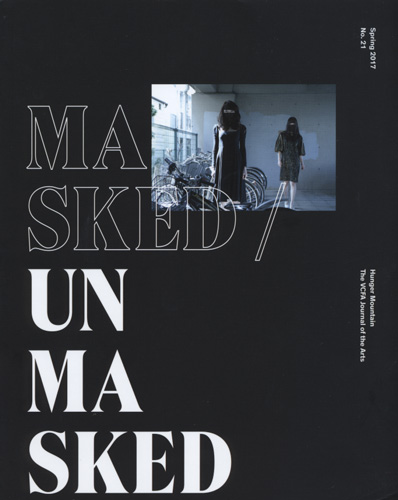Hunger Mountain – Spring 2017
Published out of Vermont College of Fine Arts (VCFA), this issue of Hunger Mountain is themed Masked/Unmasked: the perfect umbrella to explore the uncomfortable and jarring side of literature. The poetry, creative nonfiction, and fiction pieces unmask us, forcing readers to tackle our culpability and shame in order to approach art with greater humanity, vulnerability, and an open mind.
Published out of Vermont College of Fine Arts (VCFA), this issue of Hunger Mountain is themed Masked/Unmasked: the perfect umbrella to explore the uncomfortable and jarring side of literature. The poetry, creative nonfiction, and fiction pieces unmask us, forcing readers to tackle our culpability and shame in order to approach art with greater humanity, vulnerability, and an open mind.
Betsy Sholl, in the poem “Missing Person,” forces readers into the position of the bystander. We are culpable in the violence we do not prevent. Told from the perspective of a murdered woman, Stoll’s poem is muddied and mired in male violence. “I bled out in the back of a truck / and was tossed in the woods by men who swore / sober, they could never do such things.” Unflinching, Sholl’s narrator calls to us. “Passerby” she calls, “Stranger.” A raw and discomforting view of ourselves as bystanders to a crime.
In the poem “Enhanced Interrogation Techniques,” Tom Sleigh begins an uncomfortable conversation from the point of view of a torturer in the armed forces. Sleigh’s narrator uses casual language to directly address the reader and attempt to justify his actions. “You might think this is not a good defense either, / but things I did weren’t really that horrible [ . . . ] ‘Other people are doing worse things.’” Woven into the poem, however, is the narrator’s humanity portrayed through his fears, both simple and complex. His fear of insects, layered with his fear that in this job, he becomes what he does. Sleigh makes the narrator’s shame and fear visceral, visible, and, above all, human and relatable.
Patricia Smith, in her poem “Mammy Two-Shoes, Rightful Owner of Tom, Addresses the Lady of the House,” approaches unmasking as an open address that is vulnerable but never soft. Told from the perspective of Mammy Two-Shoes (the black woman nanny from the Tom and Jerry cartoons only seen from the waist down), this is a poem of heartache and servitude. Finding strength in vulnerability, Mammy Two Shoes places blame where it belongs: on you, the Lady of the House. “I have hidden in the dry dark of the pantry, weeping, / twisting the light from my fist to keep from striking you.” Unmasked, and so stronger and brutal in its honesty.
Lily Hoang’s essay, “Under and Over Promiscuity – Rome (II)” continues with the theme of vulnerability. Framed with the Greek myth of Leda and the Swan, Hoang’s essay follows her travels in Europe and the many men she sleeps with. She grapples with her desire to be desired mixed with her desire to be respected and have respect for herself. As the Director of the MFA Program at New Mexico State University, her prose is sprinkled with the expectations of a feminist academic. All the while, her words are raw and unfiltered. She analyzes her desire for group sex in the context of her primary partner’s desire: “I am so submissive that his desire for it becomes mine. Or maybe I want two dicks at once and am too entangled in gender norms to approve of that desire as my own.” Hoang’s essay turns shame and vulnerability into art.
In the story “The Man I Could Be,” Brenda Peynado personifies violence and shame. Rather than a mask, the narrator receives his father’s Army jacket from Korea. With magical realism, the jacket becomes a person all its own, wrapping the fifteen-year-old narrator in its arms. While wearing the jacket, the narrator is this man: older, more masculine, more violent, more sexual than the narrator. But despite the jacket’s appeal, the narrator explains how wearing the jacket “had felt miraculous [ . . . ] but also shameful, lying to everyone. I wanted to earn the jacket. I wanted to be that man, not wear him.” A critique of masculinity, as much as a critique of the purpose of masks, Peynado asks, what are we trying to hide?
William Alexander’s middle-grade fiction “A Tale of Three Pickles” is one of many examples in this issue to highlight VCFA’s MFA in Writing for Children and Young Adults. A young boy’s grandmother dies and he knows two things for certain: her spirit haunts the pickle jar, and her pain is collecting in an angry mask on display for the wake. Working with a literal mask, the story brings a grieving family into palpable relief. Alexander creates a story where grief and vulnerability are necessary emotions and unmasking is an expression of these inner feelings. The narrator gains strength by facing his grief.
The authors published in this themed Masked/Unmasked issue chose discomforting points of view to tell necessary stories. Hunger Mountain provides a reminder of the many masks we wear and the hope that while we grapple with shame, we can strive toward the honesty and strength of vulnerability.
[www.hungermtn.org]





